India
Understanding the Impact of Reciprocal Tariffs on India: Insights from Recent Parliamentary Updates

Contents
Introduction to Reciprocal Tariffs
Reciprocal tariffs are a key component of international trade policy that countries employ to regulate imports and exports. Essentially, reciprocal tariffs are tariffs imposed by a nation on goods imported from another nation in response to similar tariffs imposed on its exports by that nation. This mutual imposition of tariffs can serve as a trade practice aimed at balancing trade relations between countries, fostering a sense of fairness in trade agreements.
The economic motivations behind implementing reciprocal tariffs are multifaceted. Primarily, they are designed to cultivate an equitable trading environment; countries may resort to these tariffs as a means to protect their domestic industries from foreign competition. By imposing tariffs, a nation seeks to elevate the price of imported goods, thereby encouraging consumers to purchase locally produced items. This can help sustain local jobs and foster economic growth within the country.
Additionally, reciprocal tariffs can serve as a strategic tool for countries to negotiate trade deals or to respond to unfair practices in international trade. When a country perceives that its trade partner is engaging in dumping—selling goods at a price lower than their production cost—or benefiting from subsidies that distort competition, it may implement reciprocal tariffs as leverage. Countries, therefore, utilize these tariffs not only as protective measures but also as bargaining chips in the complex landscape of international trade relations.
Furthermore, the implementation of reciprocal tariffs can significantly influence trade relationships between nations. Such tariffs may lead to retaliatory measures, escalating into trade wars, which can disrupt global supply chains and adversely affect economies. Understanding the dynamics of reciprocal tariffs is crucial for assessing their impact on trade relations, particularly in the context of ongoing debates and discussions within parliamentary frameworks. This insight provides a foundation for exploring the broader ramifications of these tariffs, especially regarding India’s trade policy and international relations.
Current Status of India-U.S. Trade Relations
The trade relationship between India and the United States has evolved significantly over the years, marked by a complex interplay of exports and imports that characterize the economic ties between the two nations. As of now, the United States stands as one of India’s largest trading partners, with a diverse range of goods and services exchanged between the countries. In the fiscal year 2022-2023, bilateral trade reached approximately $150 billion, underscoring the importance of this economic partnership.
Key exports from India to the United States include textiles, pharmaceuticals, and information technology services. Conversely, India imports a variety of products from the U.S., such as machinery, aerospace components, and agricultural commodities. This dynamic exchange highlights the interconnectedness of both economies and the reliance on each other’s markets. However, tariffs have played a crucial role in shaping these trade dynamics, creating both opportunities and challenges.
Historically, the imposition of tariffs has influenced trade flows, often leading to tensions regarding trade balance. For instance, the Trump administration implemented tariffs on several Indian goods, aiming to address trade deficits. This prompted India to respond with its own set of tariffs on U.S. products. Such reciprocal tariffs significantly reflect how trade policy decisions can impact exporters and importers, resulting in a tit-for-tat scenario that complicates trade relations.
Despite these challenges, both countries have made concerted efforts to engage in dialogues aimed at resolving tariff-related disputes. Initiatives such as the U.S.-India Trade Policy Forum have fostered collaboration to enhance trade ties and find common ground. Navigating this complex landscape of tariffs is essential for India and the U.S. to maintain healthy trade relations and build a sustainable economic partnership.
The Centre’s Initiative to Update Tariff Policies
In response to the escalating trade tensions marked by recent developments in U.S. tariffs, the Indian government has undertaken significant initiatives to revise its tariff policies. The Centre is actively seeking to recalibrate its trade strategy, aligning it with the current global economic landscape while safeguarding domestic interests. This strategic shift is particularly driven by a need to protect local industries and ensure competitive pricing for consumers amidst international price fluctuations.
Recent parliamentary discussions have illuminated the legislative mechanisms involved in these tariff policy updates. Firstly, it is crucial to recognize that the Centre aims to enhance its revenue collection while simultaneously encouraging domestic production. According to sources within the government, there is a conscious effort to implement a dual approach—retaliating against foreign tariffs while also fostering bilateral trade relations through negotiations.
A notable motivation behind these policy updates is the Centre’s commitment to the ‘Make in India’ initiative. By revising tariffs, the government hopes to bolster manufacturing, reduce dependency on imports, and ultimately enhance self-reliance in various sectors. The discussions held within parliament have also underscored the importance of creating a favourable environment for foreign investment while maintaining a strategic stance on imports from nations imposing tariffs on Indian goods.
The parliamentary debates reflect a broader understanding of the implications of reciprocal tariffs, not only on trade balances but also on international relations. A significant focus has been placed on developing comprehensive policies that can adapt to fast-changing global dynamics, ensuring that India remains competitive. The Centre is keenly aware of the importance of these legislative reforms as they seek to position the nation effectively amidst evolving trade challenges and opportunities.
Also read : India’s Strategic Moves to Safeguard Exports Amid US Tariff Threats
Key Parliamentary Updates on Tariffs
Recent parliamentary sessions in India have yielded significant discussions and announcements concerning reciprocal tariffs, particularly in relation to trade with the United States. The ongoing dialogue reflects the complexities of international trade relations and the government’s approach to maintaining a balanced trade environment. During the latest sessions, several lawmakers articulated their perspectives on the implications of these tariffs.
Minister of Commerce and Industry, Piyush Goyal, emphasized the necessity for India to adopt a strategic stance on reciprocal tariffs. He stated, “In the interest of our domestic industries, we need to ensure that our tariff policies are fair and conducive to growth.” This statement underscores the government’s commitment to protecting local businesses while fostering a competitive trade environment. The minister further indicated that any proposed modifications to tariff structures would be aimed at addressing trade imbalances with countries, especially the United States, that have imposed higher tariffs on Indian exports.
Additionally, debates within the parliamentary framework revealed a divergence of opinions among political parties. Opposition members raised concerns regarding the potential adverse effects of reciprocal tariffs on Indian consumers and industries reliant on imports. For instance, Rajya Sabha member, Anand Sharma, articulated his worries, asserting, “The implementation of steep reciprocal tariffs could lead to increased prices for essential goods, harming the middle class.” This sentiment reflects the apprehensions that certain factions hold towards aggressive tariff policies.
As discussions evolve, it is clear that while the government seeks to recalibrate its tariff policies in light of international pressures, the nuances of domestic impacts cannot be overlooked. Political leaders continue to engage in robust dialogues, ensuring that both economic protectionism and global trade commitments find a balanced representation in the forthcoming policy updates surrounding reciprocal tariffs.
Economic Implications of Tariff Changes
The imposition of reciprocal tariffs by India reflects a significant shift in trade policy, carrying profound economic implications across various sectors. One key area affected is manufacturing, where tariffs can alter production costs and competitiveness. Adjustments to import tariffs may lead to increased costs for raw materials, compelling manufacturers to either absorb these costs or transfer them to consumers through higher prices. This scenario could impact domestic production, influencing profitability and potentially stunting growth in the manufacturing sector.
In the agriculture sector, reciprocal tariffs can have multifaceted effects. Restrictions on imported agricultural products may provide a temporary boost to local farmers by reducing competition. However, this protectionist stance may also lead to retaliatory tariffs from other countries, hampering agricultural exports. Consequently, the balance between local support and international trade becomes delicate, highlighting the interconnectedness of global agricultural markets.
The technology sector in India, known for its robust growth and innovation, faces unique challenges and opportunities as well. Tariff changes can impact the cost of technology imports, complicating the procurement of essential components and equipment. Furthermore, increased tariffs may deter foreign investments, which are crucial for fostering innovation and enhancing technological capabilities. If India becomes a less attractive destination for foreign capital due to tariff hikes, it could risk stalling advancements in technology that contribute to long-term economic growth.
Overall, the economic implications of reciprocal tariffs on India extend beyond immediate trade relationships. They influence various sectors, affecting employee job security, investment opportunities, and overall economic stability. Policymakers must carefully weigh these factors to strike a balance that promotes growth while safeguarding domestic interests.
Challenges Faced by India Due to Tariff Policies
The introduction of reciprocal tariffs in India poses several significant challenges that may affect its economic landscape. One of the primary concerns revolves around the pressures exerted on exporters. As tariffs increase, Indian exports may become less competitive in global markets, leading to a potential decline in demand. Exporters who rely heavily on markets that are now imposing reciprocal tariffs may face a stark reduction in their market share, ultimately impacting their revenue and growth prospects.
Moreover, the competitive disadvantages created by reciprocal tariffs can have far-reaching effects. Countries that impose tariffs may be incentivizing their domestic industries while placing Indian products at a higher price point. This results in reduced competitiveness for Indian goods abroad, which could exacerbate trade balances and interfere with established supply chains. The trade dynamics may compel Indian companies to reassess their pricing strategies, potentially leading to reduced profit margins and business viability.
In addition, the risk of trade wars looms large as countries retaliate against each other’s tariff implementations. Such trade conflicts can escalate, creating an uncertain economic environment that discourages investment and long-term planning. The likelihood of retaliation could compel India to engage in counter-tariffs, further complicating trade relations and affecting a multitude of sectors, from agriculture to technology.
Particularly vulnerable to these changes are small and medium enterprises (SMEs), which often operate with limited resources and may lack the capacity to absorb increased costs associated with tariffs. These businesses, which are crucial to India’s economic fabric, could face existential threats if unable to adapt quickly to fluctuating international trade conditions. The cumulative effect of these challenges, stemming from reciprocal tariffs, raises critical concerns for India’s economic stability and growth trajectory in the forthcoming years.
Global Reactions to the Tariff Updates
The recent updates concerning reciprocal tariffs between India and the United States have sparked significant global interest and various reactions from countries around the world. Many nations are closely observing this bilateral trade development, with some viewing it as a potential benchmark for shaping their own tariff policies. In particular, countries with existing trade agreements or negotiations underway with both India and the U.S. have begun reassessing their strategies in light of these changes.
For instance, nations within the Southeast Asian region, which have been exploring closer ties with India through the Regional Comprehensive Economic Partnership (RCEP), are considering how these tariff updates may affect their competitiveness in the market. Some economists suggest that the new tariff structures could encourage neighboring countries to either align more closely with India’s trade framework or implement protective measures to shield their industries from potential disruptions.
Similarly, European countries are evaluating the implications of India’s tariff adjustments from a transatlantic perspective. Observers note that if the U.S. and India establish a precedent of reciprocal tariffs, it might influence existing trade relations not only between these two nations but also with Europe, possibly affecting trade policies concerning specific sectors such as agriculture and technology.
Moreover, developing economies that rely heavily on exports to both India and the U.S. are watching the situation with concern. They fear that increased tariffs may reduce access to these crucial markets, leading to a ripple effect throughout various supply chains. In particular, manufacturers and exporters are anxious about how tariff revisions could impact their operational costs and competitiveness.
Overall, the global reactions to India’s tariff updates reflect a complex landscape of international trade considerations, where nations are not only gauging the immediate economic implications but are also strategizing for long-term policy adjustments amidst evolving trade dynamics.
Expert Opinions and Analysis
Recent updates on reciprocal tariffs between India and the United States have sparked a diverse range of opinions among economists, trade experts, and political analysts. Many experts believe that these tariffs could significantly influence India’s trade dynamics, particularly in light of its reliance on the U.S. market for various exports. One prominent economist emphasized that while the introduction of reciprocal tariffs may initially create tension, the long-term effects could lead to a more balanced trading relationship. This individual suggested that India should focus on enhancing its competitive edge by investing in sectors that align with current U.S. demands, thus mitigating potential adverse impacts.
In contrast, some trade experts express concerns that the imposition of tariffs could escalate into a trade war, potentially disrupting supply chains and negatively affecting both countries. They argue that India should adopt a cautious approach, engaging in diplomatic dialogues aimed at reducing trade barriers. These analysts stress the importance of understanding the broader geopolitical context and recommend that India also explore trade partnerships with other nations to diversify its export markets, reducing dependence on the U.S.
Political analysts have also weighed in on this issue, highlighting the influence of domestic politics on international trade strategies. They suggest that India must navigate the complexities of its trade relationship with the U.S. while considering the needs of local industries and businesses. As such, maintaining a balanced perspective is essential to ensure that Indian policies do not disproportionately favor one sector over another. The consensus among experts seems to favor a multifaceted strategy that combines diplomatic engagement with proactive measures in promoting domestic industries.
As India continues to refine its approach to reciprocal tariffs, a comprehensive understanding of expert insights is crucial for developing effective trade policies moving forward.
Conclusion and Future Outlook
The discussions surrounding reciprocal tariffs have significant implications for India’s trade landscape. As outlined in the preceding sections, India has faced increased tariff challenges from various countries, notably the United States. These reciprocal tariff arrangements have prompted the government to reassess its trade policies and engage in strategic negotiations to safeguard its economic interests. The recent parliamentary discussions emphasize the need for a balanced approach in addressing tariff barriers while promoting domestic industries.
Currently, the landscape of reciprocal tariffs suggests a complex relationship between trade partners, particularly between India and the U.S. As both nations navigate their economic interactions, the ongoing adjustments to tariffs could potentially realign trade flows and influence market accessibility. Moreover, India’s proactive stance in seeking bilateral agreements reflects a commitment to enhancing its global economic presence amidst evolving trade dynamics.
Looking ahead, the future of India-U.S. trade relations hinges on various factors including geopolitical tensions, changes in domestic policies, and the overarching global economic climate. Possible scenarios could range from increased collaboration between the two nations, potentially leading to reduced tariff barriers, to heightened trade disputes that may complicate economic exchanges. Additionally, the impact of international trade regulations and alliances will also play a crucial role in shaping these outcomes.
In conclusion, the evolving nature of reciprocal tariffs not only affects bilateral trade but also has broader implications for global trade patterns. As India continues to adapt to these changes, it stands at a pivotal point where strategic decisions regarding tariffs, negotiations, and trade policies will be paramount in determining its economic trajectory in the coming years. By fostering constructive trade relations and staying attuned to international market trends, India can position itself favorably in a competitive global trading environment.
Crime
Vandalism by Kanwariyas in Meerut: School Bus Attacked, FIR Registered
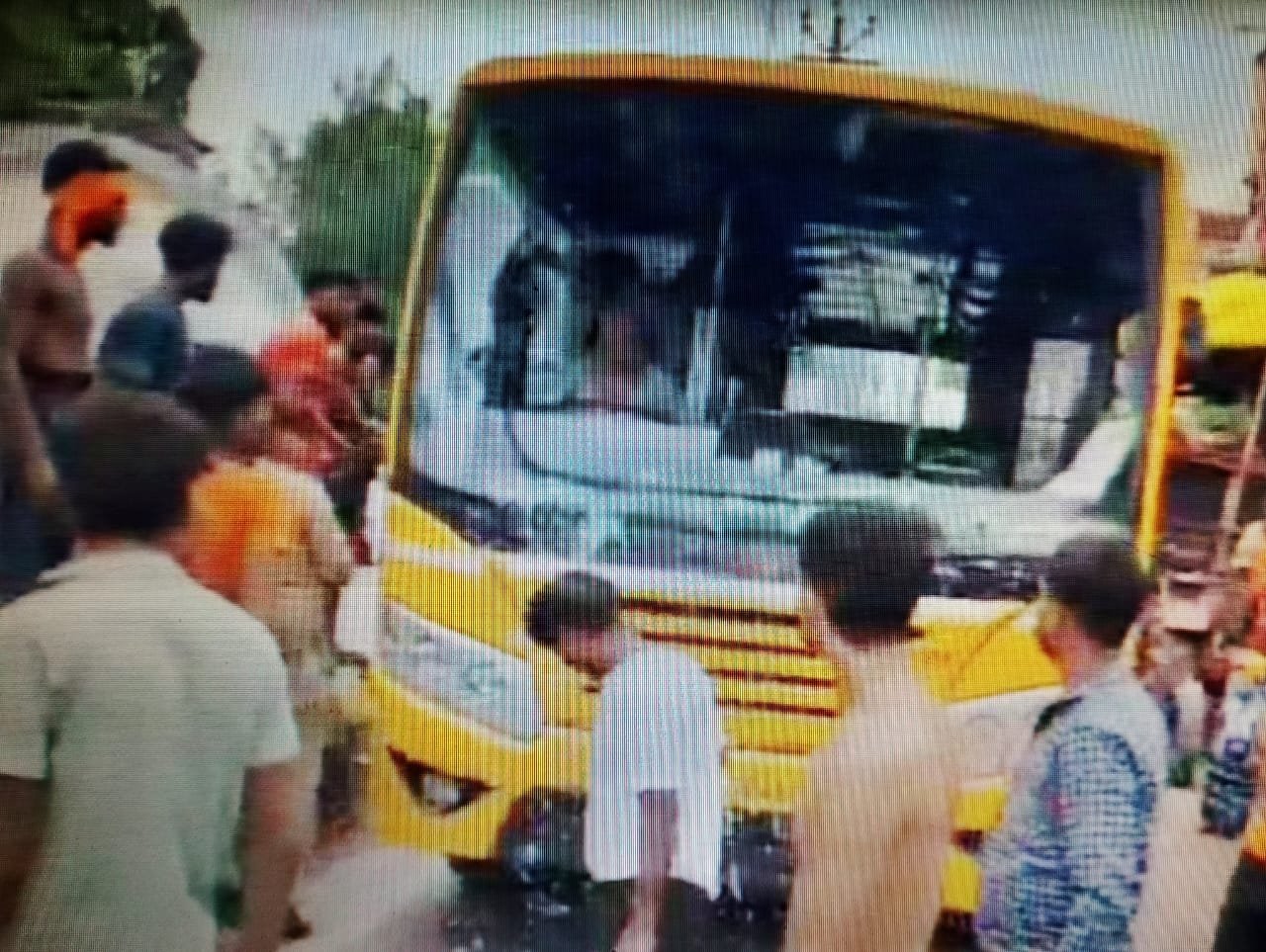
Contents
Meerut, July15,2025
Tension flared in Meerut’s Sadar Bazar area after a group of Kanwariyas allegedly vandalized a school bus during the annual Kanwar Yatra. The incident occurred on Monday, July 14, prompting swift police action.
According to the complaint filed by Sub-Inspector Gaurav Kumar, 4-5 unidentified youths got into an argument with the bus driver. The confrontation escalated quickly, with the accused allegedly hurling abuses, issuing death threats, and smashing the bus windows.
Upon receiving the alert, police rushed to the spot and found the bus in a damaged condition, surrounded by a large crowd.
Bus Windows Shattered by Kanwariyas
Confirming the incident, Circle Officer (CO) Santosh Kumar of Meerut Cantonment said the police had been informed about a scuffle involving a group of youths and the bus driver. “They had broken the windows of the bus. We immediately reached the spot and ensured the safety of both the driver and the vehicle,” he stated.
FIR Lodged, Investigation Underway
A case has been registered under various sections of the Bharatiya Nyaya Sanhita (BNS), and efforts are on to identify the culprits through video footage. Officials have assured that strict legal action will be taken against those found guilty.
India
A Milestone Towards Gaganyaan: PM Modi Welcomes Group Captain Subhanshu Shukla After Historic Space Mission
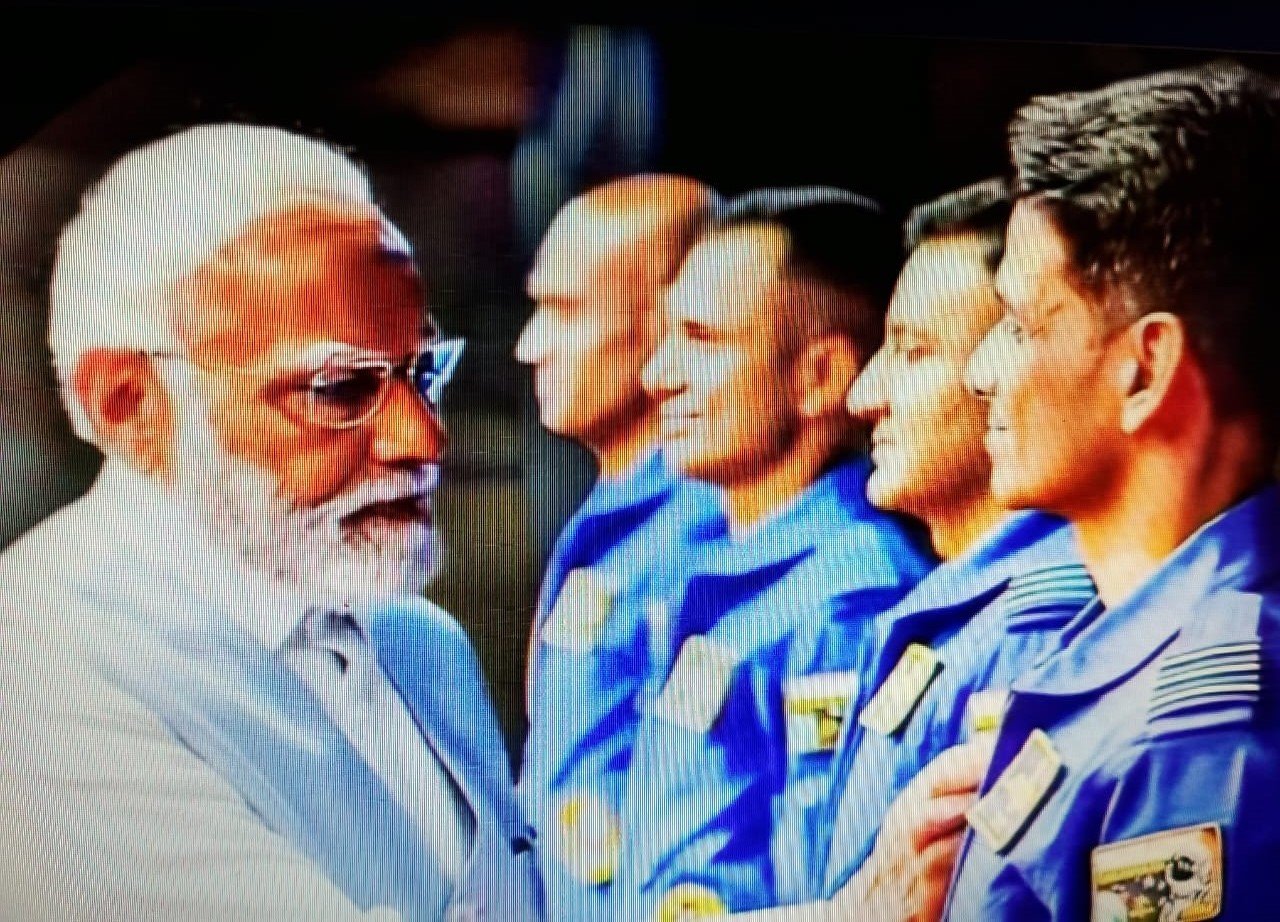
New Delhi, July15,2025
Prime Minister Narendra Modi has lauded Group Captain Subhanshu Shukla for his successful return from space, calling it a proud moment for the nation and a significant step toward India’s ambitious Gaganyaan mission.
Taking to social media, PM Modi wrote,
“I join the entire nation in welcoming Group Captain Subhanshu Shukla as he returns to Earth from his historic space mission. As the first Indian to visit the International Space Station, Subhanshu has inspired millions with his dedication, courage, and pioneering spirit. This marks another milestone on the path toward our own human spaceflight mission – Gaganyaan.”
“Touching the skies, lifting India’s dreams”
Defence Minister Rajnath Singh also expressed pride over the successful completion of the Axiom-4 mission. In a heartfelt social media post, he wrote:
“Group Captain Subhanshu Shukla’s successful return from the historic Axiom-4 mission is a moment of immense pride for every Indian. He has not only touched space but has elevated the dreams of India to new heights.”
Singh further emphasized that Subhanshu’s journey to and from the International Space Station is not merely a personal achievement but a major stride in India’s expanding space ambitions.
“I pray for his continued success in all future endeavors,” he added.
Subhanshu Shukla’s mission marks a new chapter in India’s space exploration story, strengthening the country’s position on the global stage and inspiring the next generation of Indian astronauts.
Crime
Tension in Jaipur’s Ramganj Area After Alleged Harassment Incident Sparks Stone-Pelting Between Communities

Contents
Jaipur, July 15,2025
Tension gripped the Ramganj area of Jaipur on Saturday after an alleged incident of harassment involving a woman escalated into a violent clash between two communities. The confrontation, which began as a verbal dispute, quickly turned into stone-pelting, causing panic in the neighborhood.
The incident occurred in the Babu Ka Tika locality, a part of Ramganj known for its sensitive history. According to eyewitnesses, a few young men from one community allegedly misbehaved with a local woman. When members of the other community confronted them, the situation escalated rapidly. What started as an argument soon turned into chaos, with both sides hurling stones at each other.
Several people were reportedly injured in the clash, although the police have not yet released an official statement regarding the number or severity of the injuries. Locals also reported damage to nearby shops and vehicles, adding to the fear and anxiety in the area.
Police forces rushed to the scene as soon as the incident was reported. To prevent further escalation, additional security personnel were deployed, and patrolling has been intensified throughout the neighborhood. The situation is currently under control, but authorities are maintaining a heightened security presence in the area as a precaution.
Ramganj is considered one of Jaipur’s most densely populated and communally sensitive areas, with a history of similar tensions. Given the seriousness of the incident, the police have launched a full investigation. CCTV footage from the area is being reviewed to identify those involved in the violence.
Officials have assured that strict action will be taken against anyone found responsible. The local administration has urged residents not to pay heed to rumors and to maintain peace. Authorities emphasized that no one will be allowed to disturb law and order under any circumstances.
Andhra Pradesh
Andhra Pradesh: Class 9 Student Dies After School Fight with Classmate in Bobbili
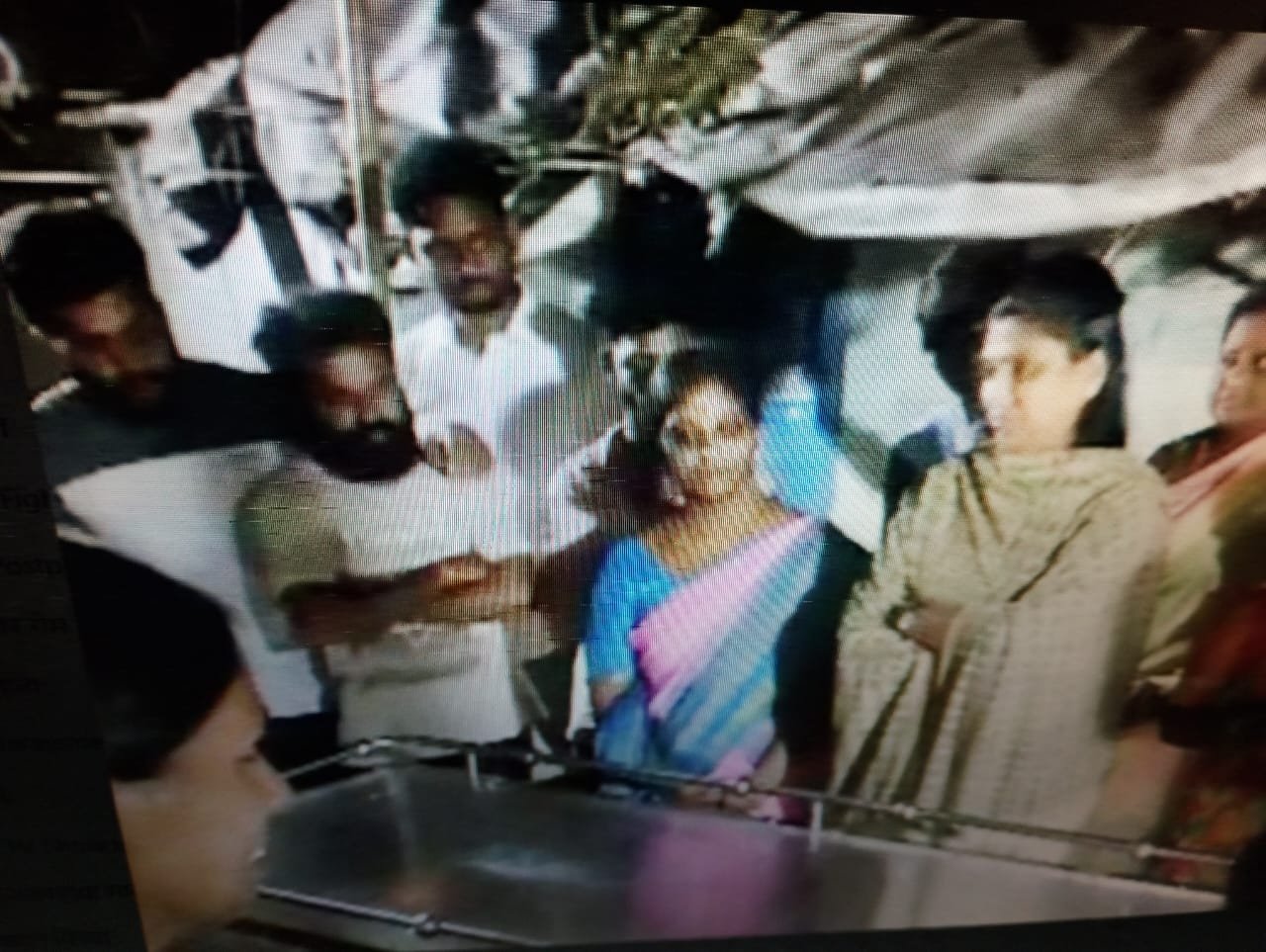
Andhra Pradesh, July15,2025
In a tragic incident from Bobbili town in Andhra Pradesh, a 14-year-old Class 9 student died after a scuffle with a classmate moments after school got over. The boy, identified as Sundarada Karthik, reportedly got into a fight near the Bobbili Fort, where he was punched by his classmate, collapsed, and later succumbed to his injuries at the hospital.
According to police sources, Karthik, a resident of Ravu Gari Street and a student of Class 9, frequently argued with a fellow classmate over petty issues. Their rivalry had been escalating for some time.
On Monday, just after the school had closed for the day, the two boys reportedly encountered each other again near the Bobbili Fort. According to eyewitness accounts and police reports, Karthik allegedly provoked his classmate and challenged him to a fight. The argument quickly turned physical. During the altercation, the other boy is said to have punched Karthik, who fell unconscious on the spot.
He was immediately rushed to a nearby hospital, but doctors declared him dead on arrival.
The incident has shocked the local community and raised concerns about rising aggression among schoolchildren. Police are investigating the matter and questioning witnesses to determine the exact sequence of events.
Crime
Death Sentence of Indian Nurse Nimisha Priya Postponed, Major Update from Yemen

Yemen, July 15,2025
In a major relief, the execution of Indian nurse Nimisha Priya has been postponed, according to sources. Nimisha, who hails from Kerala, was scheduled to be hanged in Yemen on July 16. The latest reports suggest that a significant development has taken place, temporarily halting the sentence that had sparked international concern.
Nimisha’s case has drawn widespread attention and emotional appeals from across India and the global Indian community. The postponement has brought a moment of hope for her family, well-wishers, and the many people who have been campaigning tirelessly for her life to be spared.
Crime
Odisha: Student Who Accused College Professor of Sexual Harassment Dies by Suicide, Father Alleges She Was Pushed to Take Extreme Step
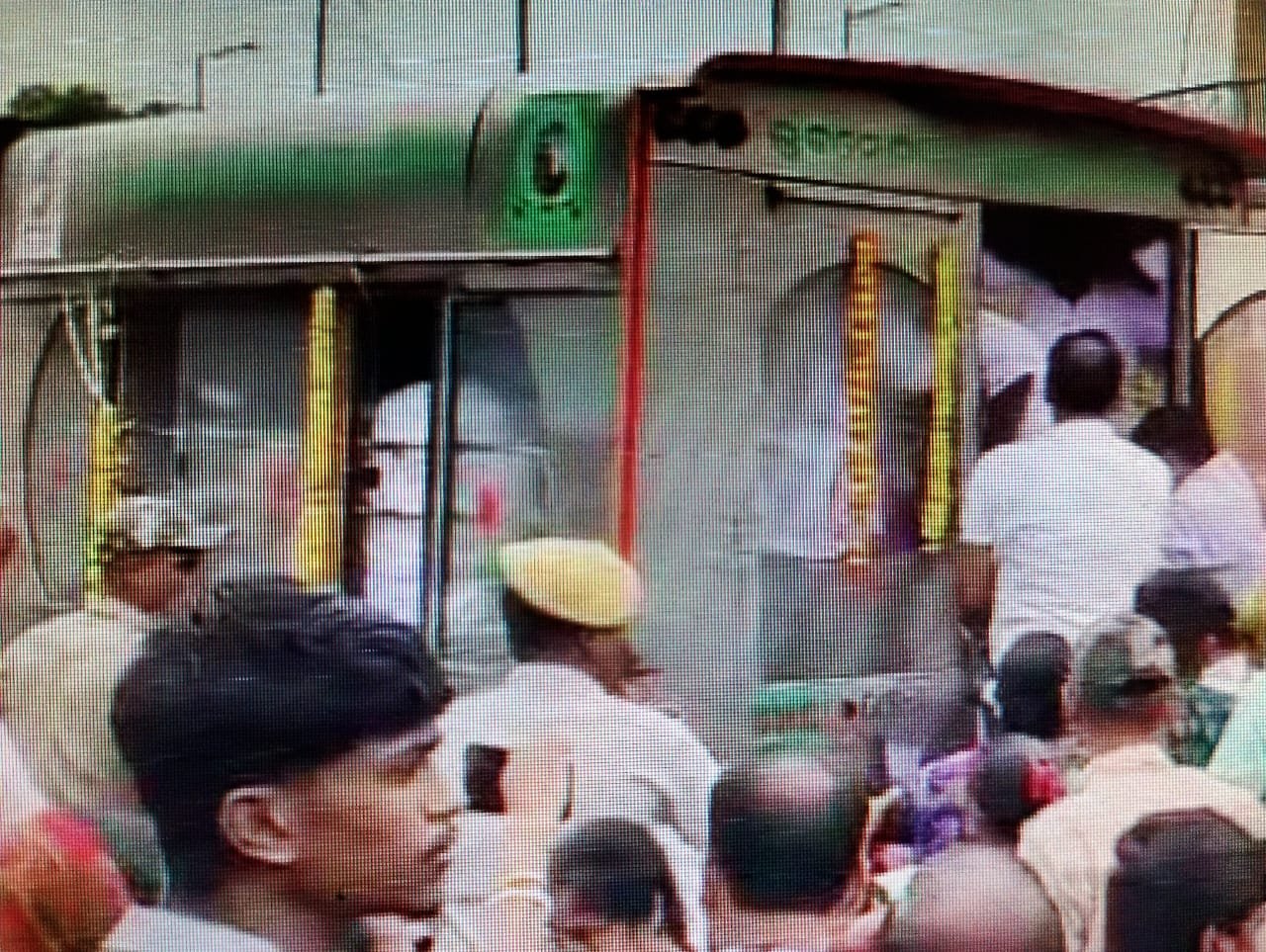
Odisha, July15,2025
Bhubaneswar, Odisha – A college student who had attempted suicide after alleging inaction on her sexual harassment complaint has died while undergoing treatment at AIIMS Bhubaneswar.
The student had accused the Head of Department at Fakir Mohan College in Balasore of sexually harassing her. She took the drastic step on Saturday, allegedly due to frustration over the lack of appropriate action on her complaint. Following the attempt, she was admitted in critical condition to AIIMS Bhubaneswar, where she later passed away.
The student’s father has now come forward with serious allegations against the internal inquiry committee, claiming that their mishandling and a deliberately misleading report forced his daughter into taking her own life.
Speaking to the media, he said, “We are seeking justice. Merely arresting two individuals won’t suffice. My daughter was mentally tortured and pushed to the edge. The internal committee members are equally responsible. I request the government to take the strictest possible action against them.”
The case has sparked widespread outrage and calls for a thorough and transparent investigation into how the college handled the complaint and whether the internal committee was complicit in suppressing the matter.
As the family mourns their irreparable loss, voices demanding accountability grow louder, raising critical questions about institutional response to sexual harassment complaints in educational institutions.
Crime
Principal Arrested After Student’s Suicide Attempt in Odisha College Over Sexual Harassment Complaint
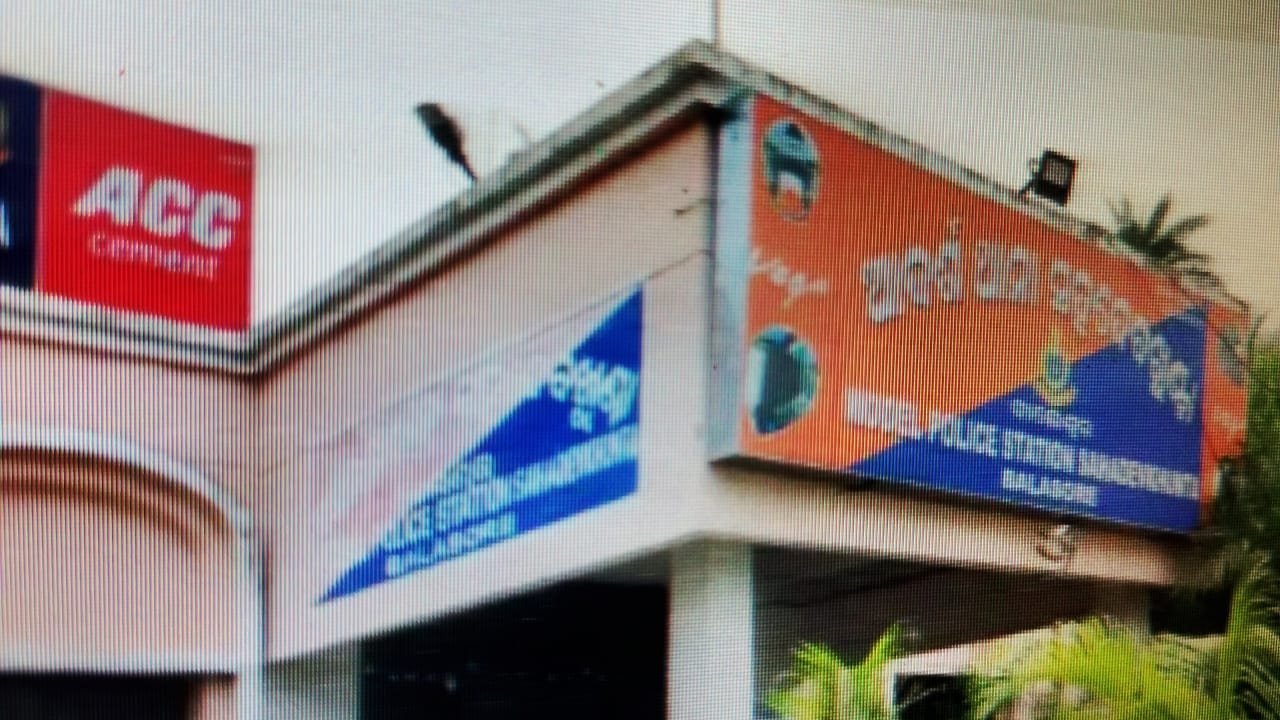
Odisha, July 14,2025
In a shocking development from Balasore, Odisha, the principal of Fakir Mohan College, Dilip Kumar Ghosh, has been arrested by Sahadevkhunta Police following a student’s suicide attempt on campus.
The arrest comes after a female student of the college allegedly attempted suicide on Saturday, accusing a faculty member of sexual harassment. The student is currently in critical condition and receiving treatment at AIIMS Bhubaneswar.
Confirming the arrest, Balasore Superintendent of Police, Raj Prasad, told BBC that the principal was taken into custody for his alleged negligence in handling the student’s repeated complaints.
According to the victim’s family, the girl had been subjected to ongoing sexual harassment for several months. Despite lodging a formal complaint with the college authorities, no meaningful action was taken. Frustrated and distressed by the college’s inaction, the student reportedly attempted to take her own life.
The family had been demanding the arrest of the principal, alleging that he failed to take timely and appropriate action. They also accused the college’s internal inquiry committee of trying to protect the accused teacher, instead of supporting the victim.
Earlier, the police had arrested the Head of the Department (HoD) of the Education Department, Sameer Kumar Sahu, who is the prime accused in the sexual harassment case.
On Sunday, Odisha Chief Minister Mohan Charan Majhi addressed the issue, stating,
“An investigation is underway to understand the full circumstances of the incident. The government will ensure strict action is taken against those responsible.”
The incident has sparked widespread outrage, highlighting the urgent need for stricter enforcement of sexual harassment protocols within educational institutions.
Environment
Literature and Environment Are Both Sources of Sensitivity”Tree is Life: Grand Celebration of ‘Ek Ped – Sampark Ke Naam’ and Poetry Recitation on Environment
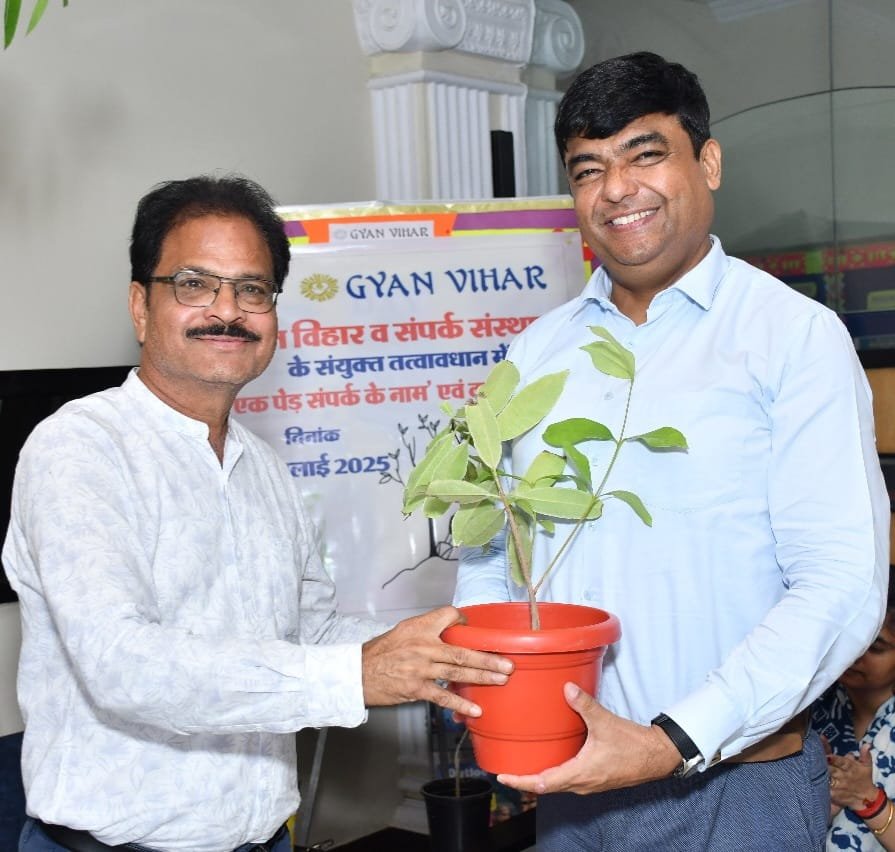
Jaipur, July 14,2025
A Heartfelt Environmental and Literary Initiative by Sampark Sansthan Receives Overwhelming Response at Gyan Vihar School Campus Jaipur.
The joint initiative of Sampark Sansthan and Gyan Vihar School, titled ‘Ek Ped – Sampark Ke Naam’, along with an environmental poetry recital, turned out to be a meaningful confluence of ecological awareness and literary sensibility. Students, teachers, poets, and social workers participated in the event with deep enthusiasm and emotional engagement.
Welcoming everyone, Sampark Sansthan President Anil Ladha remarked,
“This is not just an event, it’s an attempt to connect life and society through tree plantation. We want every individual to nurture a tree as lovingly as they would nurture a relationship.”
Dr. Ritvij Gaur (Principal), present as a special guest, emphasized in his speech,
“Trees are the foundation of our culture and survival. Teaching children to emotionally connect with nature through tree planting is the need of the hour.”

Sampark Sansthan General Secretary and Coordinator Renu ‘Shabdmukhar’ touched hearts with her words,
“This initiative aims to instill in students a sense of responsibility and the spirit of coexisting with trees. When nature and poetry walk together, society becomes truly awakened.”
Veteran poet Prof. Prabodh Govil inspired the audience, stating,
“Literature and environment are both profound sources of human sensitivity.”
Renowned writer Dr. Jayshree Sharma added,
“Trees don’t just give us oxygen, they teach us life values. A poem, a plant, and a thought — these can together change the world.”
Inspiring the young generation, senior poet Anshu Harsh quoted,
“When you walk ahead, many will follow.”
Usha Rastogi’s positive presence brought an energetic vibe to the event.
Program Coordinator Himadri Samarth expressed that,
“No matter what name we give to the campaign, the aim remains the same – to protect the environment.”
He concluded by thanking all the distinguished guests for their participation and support.
The event was beautifully hosted by Seema Walia, whose graceful voice, articulate language, and emotional tone left a lasting impact on everyone present.
The active participation of Gyan Vihar students made the event truly vibrant. When tiny hands touched the soil and planted saplings, it was more than an activity — it became a symbol of emotional bonding with nature.
Students like Charul, along with senior poets — Dr. Neelam Kalra, Renu Shabdmukhar, Himadri, Dr. Kanchana Saxena, Sonal Sharma, Dr. Anju Saxena, Avinash Joshi, Dr. Punita Soni, Kavita Mathur, S. Bhagyam, Rao Shivraj, Dr. Deepali, Vijayalakshmi, Sushila Sharma, Sushma Sharma, Meena Jain, Mahesh Sharma, and Nisha Jha — delivered powerful poetic performances centered on environmental consciousness. The students not only listened but also absorbed the essence of literature as a tool for raising awareness about nature.
The event sent a strong message — if the young generation connects with nature today, the future will be safe, beautiful, and full of hope.
Art
Sattva, Rajas, Tamas” Come Alive on Canvas – Dr. Renu Shahi’s Indian Philosophical Art Shines in Sri Lanka

Colombo/Jaipur, July 14,2025
In a vibrant celebration of artistic expression and cultural wisdom, Indian artist Dr. Renu Shahi has drawn deep admiration for her spiritually inspired paintings at an international art exhibition titled “Uncharted”, held at the Curado Art Space in Colombo, Sri Lanka.
Organized by the Rainbow Art Group, New Delhi, this cross-border exhibition featured 49 contemporary artists from six countries, each offering their unique visual interpretations. Amid this diversity, Dr. Shahi’s works stood out — not only for their aesthetic depth but also for their philosophical grounding.
Her three paintings, inspired by verses from the Bhagavad Gita, revolved around the three fundamental qualities of human nature: Sattva (purity), Rajas (passion), and Tamas (inertia). Through rich symbolic imagery and subtle layering, she represented these gunas not merely as abstract ideas, but as divine forces shaping the human experience. Each artwork intertwined color, mythology, and introspection into a single visual meditation.
The exhibition, which ran from July 4th to 10th, was inaugurated by Shanila Alles, Director of Curado Art Space, and curated by Virendra Kumar, the visionary founder of Rainbow Art Group. The group’s mission is to highlight artists who explore Indian culture, spirituality, and heritage through their canvas, offering them a global stage to be seen and heard.
“For us, art is a language that speaks beyond words,” said Kumar. “It transcends geography and unites minds — whether you’re from Jaipur or Jakarta.”

Alongside Dr. Shahi, notable artists such as Banita Rani Singh, Bhaskar Ghosh, Dr. Chetna Agarwal, Manju Saad, Manoj Chakravarty, and Nayana Mevada, among others, showcased their works. Artists hailed not just from India but also from Nepal, Sri Lanka, Qatar, Indonesia, and Belarus. Each piece was a window into the artist’s soul — and some of those windows were so captivating that a few artworks were sold, a testament to the audience’s deep connection with the themes.
Rainbow Art Group has, over the years, emerged as a powerful platform nurturing both emerging and established talent. Its exhibitions reflect a belief that “art needs no passport — it is the purest dialogue between cultures.”
Dr. Renu Shahi’s series served not just as paintings, but as philosophical experiences — introducing Sri Lankan viewers to the timeless teachings of Indian scriptures, not through sermons, but through strokes of color, layers of thought, and a visual silence that speaks louder than words.
Crime
Don’t Hang Nimisha Priya in Yemen: Supreme Court to Hear Plea Today Seeking Diplomatic Intervention to Save Kerala Nurse

Contents
New Delhi, July14,2025
The life of Indian nurse Nimisha Priya, who has been sentenced to death in Yemen, hangs by a thread. With the execution scheduled for July 16, her family and well-wishers are making desperate last-minute efforts to save her.
Today, the Supreme Court of India will hear a critical petition filed by the Save Nimisha Priya International Action Council, urging the Indian government to step in diplomatically and prevent her execution. The matter will be taken up by a bench comprising Justice Vikram Nath and Justice Sandeep Mehta.
What is Nimisha Priya Accused Of?
According to Yemeni court documents, Nimisha, who has been living in Yemen since 2008, was accused of murdering her business partner Talal Abdo Mahdi. Reports allege that after the murder, she, along with another nurse, dismembered his body and disposed of the remains in a water tank.
However, Nimisha’s family strongly denies the murder charges. They claim that Nimisha did not intend to kill Talal. According to them, she only administered an injection to render him unconscious so she could retrieve her confiscated passport. Tragically, due to an overdose, he died — making it an accidental death, not murder.
Pleas for Mercy Rejected
In a heartbreaking turn of events, Nimisha had earlier filed an appeal against the death sentence in Yemen’s Supreme Court, but it was rejected. She also made a mercy plea to the President of Yemen, which too was denied.
A Mother’s Last Hope
Nimisha’s family has made multiple appeals for help — reaching out to both Kerala Chief Minister Pinarayi Vijayan and the central government. CM Vijayan personally wrote to Prime Minister Narendra Modi, urging him to intervene and use all diplomatic channels possible to halt Nimisha’s execution.
The Ministry of External Affairs (MEA) has stated that it is doing all it can to provide support to Nimisha’s family and is in touch with relevant authorities.
Why This Case Matters
This is not just a legal case; it’s a human story of desperation, fear, and a plea for compassion. A mother, a nurse, an Indian citizen – Nimisha Priya is facing death in a foreign land. Her family is fighting to give her a second chance, hoping that diplomacy and humanity will prevail where legal appeals have failed.
As the clock ticks towards July 16, all eyes are now on the Supreme Court of India and the Indian government — will they act in time to stop the execution and bring Nimisha home alive?
Nimisha Priya, Yemen death penalty, Indian nurse, diplomatic intervention, Supreme Court India, Save Nimisha Priya campaign, Kerala news, Talal Abdo Mahdi, Pinarayi Vijayan, Narendra Modi

 Education1 month ago
Education1 month agoKota ICICI Bank Staffer Swindles ₹4.5 Crore, Gambles It All on Stock Market

 Bollywood1 month ago
Bollywood1 month agoHousefull 5 Movie Review: Akshay Kumar, Riteish Deshmukh Bring Laughter and Twists in Bollywood’s Biggest Comedy Franchise

 Education3 weeks ago
Education3 weeks ago11 Powerful Reasons Why DAV International Yoga Day Jaipur Uplifted Spirits!

 Cricket1 month ago
Cricket1 month agoBengaluru Chinnaswamy Stadium Stampede: 11 Dead, 33 Injured in RCB Victory Parade Chaos

 Education3 weeks ago
Education3 weeks ago7 Inspiring Highlights of DAV Foundation Day Jaipur Celebration – Amazing Vedic Legacy Revealed!

 Education2 weeks ago
Education2 weeks agoEmpowering Educators: A Three-Day Learning Journey at DAV Centenary Public School, Jaipur

 Credent TV3 weeks ago
Credent TV3 weeks agoVIBGYOR Summer Camp Ends on a High at DAV Centenary Public School, Jaipur

 Election1 week ago
Election1 week agoDAV Centenary Public School, Vaishali Nagar, Jaipur Event Report: Talent Hunt Show


































